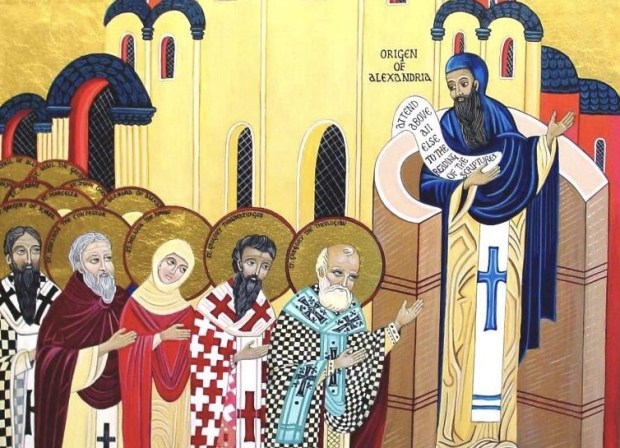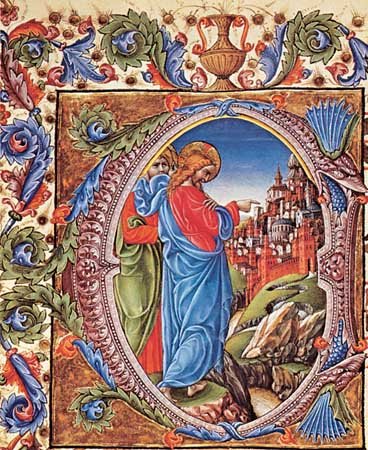|
This is a non-WLC article. When using resources from outside authors, we only publish the content that is 100% in harmony with the Bible and WLC current biblical beliefs. So such articles can be treated as if coming directly from WLC. We have been greatly blessed by the ministry of many servants of Yahuwah. But we do not advise our members to explore other works by these authors. Such works, we have excluded from publications because they contain errors. Sadly, we have yet to find a ministry that is error-free. If you are shocked by some non-WLC published content [articles/episodes], keep in mind Proverbs 4:18. Our understanding of His truth is evolving, as more light is shed on our pathway. We cherish truth more than life, and seek it wherever it may be found. |

Plato (c. 428-348 BC) believed that the myths about the Greek gods were false, immoral stories made up by men (he may have got that right!). He believed in a spiritual world of perfection (a world of ideas/forms). Basically, he believed that what we see in this world are imperfect copies of what is in the perfect, spiritual world. The false teaching of the immortal soul originated mainly with Plato. He started a Hellenistic “school of philosophy” which has had many students throughout the centuries — “Greek philosophy.” We in the West tend to think like Greeks — not like Hebrews.
Greek philosophy even influenced the Jews. One of these was the famous Philo (c. 20 BC-50 AD), the Jew who some believe influenced the Nicene Creed, even though he had been dead for 300 years. Some believe “Light from Light, true from true God” in the Nicene Creed came from Philo’s writings. I looked that up and am satisfied it is most likely true.
According to famous church historian Jaroslav Pelikan, who read and commented on all 38 volumes of the church fathers’ writings, the Neo-Platonists of the third century followed in the steps of the Greek philosophers. They continued with old ideas and developed new ideas. One of these ideas was that in the metaphysical world/world of ideas, there are the three elements — the One, the Intellect, and the Soul — and these three are ontologically one, one in essence. Sound familiar? This was the idea of Plotinus (c. 204-270 AD). He believed that the physical is evil and the spiritual is good, i.e., Gnostic thinking. Augustine of Hippo appears to have been influenced by this same type of thinking, and made sex almost a sin — even within marriage.
It is well known that some of the early Christian fathers, such as Justin Martyr, Tertullian, Clement of Alexandria and Theodosius, were influenced by Greek philosophy. I have read their writings and none of these men were Trinitarian. This is a false idea spread by Trinitarians who take quotes out of context and hope no one (like me) goes and reads the original writings for themselves! Justin Martyr was an Arian (believing the Son was created) who placed the beginning of the Logos (the Word) at the beginning of creation (not Trinitarian!). Tertullian believed the Son was subordinate to the Father, which of course the Church later rejected as heretical. Theophilus of Antioch spoke of God, His Word and His Wisdom (but that’s not the Trinity!). In fact, Jaroslav Pelikan says that many of the early church writers seemed to be more “modalist” (Oneness) than Trinitarian in their thinking.
The early church fathers were more interested in “Logos theory” than the Trinity, i.e. how Yahuwah related to the Word. Almost all of them believed that the Son was subordinate to the Father, which is not what the Trinity teaches. Contrary to the Bible, the Trinity does not teach subordinationism. When Arius quoted the church fathers and the Bible to Emperor Constantine, Constantine changed his position and exiled Athanasius. He became an Arian himself and was baptized on his deathbed by an Arian bishop, Eusebius of Nicomedia.
 |
|
“Origen Teaching the Saints,” Eileen McGuckin |
Along came Origen (c. 184-253). He was heavily influenced by all this Greek philosophy. He believed in the preexistence of souls — that we were all immortal souls up in heaven before we became babies in the womb, and he also believed in universal salvation — everyone will be saved. No wonder he got excommunicated! At Origen’s school in Alexandria, all these Greek philosophical ideas were encouraged to be read. It is interesting that a man called Rufinus admits he changed Origen’s writing to help get Origen’s excommunication overturned after he had died. We can prove this is the case because manuscript fragments of Origen’s writings don’t match Rufinus’ book. Origen’s writings were burnt, but fragments remained. Origen was the first to use the words “timeless Son” — although he also used the word “created” in reference to the Son. He was all over the place.
Because of persecution, churches were not able to liaise very easily with each other until the end of the third century. There were a few councils held in the third century, because there were many ideas floating around:
Modalism/Monarchianism/Sabellianism, Unitarianism, Arianism, Adoptionism, Docetism, etc.
When Constantine was supposedly converted (c. 312), he found the Church in disarray, and the “great” period of the Church Councils began. At that time Arius was saying that the Son was created, and that was a problem to both Athanasius (who was a Trinitarian) and the semi-Arians in the East who believed the Son was begotten out of the Father, though not an eternal “God the Son” Person. The Semi-Arians counseled Arius and thought they had won him over, but I doubt that happened.
To try to unify the Church and help his empire, Constantine called for the council of Nicea in 325 AD. This was to decide the nature of Yahushua the Son. It was decided that the Son was “homoousios” (the same essence as Yahuwah) and not “homoiousios” (of similar essence as God). The decision was that Arianism was unorthodox. Only about three Arians voted against the council, and they were exiled. No decision was made on the Holy Spirit, and there still remained many ideas on who or what the Holy Spirit was even until 381 AD.
What the Trinitarians never mention is that the debate continued after Nicea. Arius got into the ear of the Emperor Constantine, and he and both his sons became Arians. Then in 357 AD another even larger council than Nicea was held that declared Arianism orthodox (Third Council of Sirmium).
 |
|
“Cappadocian fathers” — Basil the Great, Gregory of Nyssa, and Gregory of Nazianzus |
This created more division, and men such as the “Cappadocian fathers” — Basil the Great, Gregory of Nyssa, and Gregory of Nazianzus — rose up to defend the Trinity. Basil and Gregory of Nyssa were brothers who were brought up in a Christian family. Their father (Basil the Elder) had been influenced by Greek philosophy. Basil the Great wrote a document on the Holy Spirit being the third co-equal, co-eternal God- person of the Trinity, which greatly influenced the Council of Constantinople in 381 AD. Thus the Holy Spirit officially became orthodoxy’s third co-eternal, co- equal God-Person of the Trinity.
All the Cappadocian fathers were readers of Greek philosophy. They tried to work out how three distinct Persons, each of whom is God, with separate minds and separate wills, could be one God and not three Gods. They never got there. They tried to work through all these issues using the thinking of Greek philosophers like Plotinus — the three principles: the One, the Intellect and the Soul, and these three are ontologically one. They even admitted that they couldn’t logically make three into one.
 |
|
“Jesus Before the Gates of Jerusalem,” manuscript illumination by Liberale da Verona, 1470–74; in the Piccolomini Library, Siena, Italy. SCALA/Art Resource, New York |
For centuries theologians have tried to understand how three Persons — each of whom is God — can be one God. They wrestle with questions like:
- Is God a social Trinity? An economic Trinity?
- Is the Nicene Creed correct when it says that God is one hypostasis or is the Creed of Constantinople correct when it says that God is three hypostases? • Are the Roman Catholics right about their Trinity, or are the Eastern Orthodox correct?
- Are those who believe in the kenosis (emptying) theory correct or those who oppose it? How could God the Son remain God and empty Himself of the divine attributes that make Him “God”?
Enter into all this Augustine of Hippo (354-430). It appears he too was influenced by the Neo-Platonist thinkers of the third century. Through his writings and with the previous persecution by Emperor Theodosius, who made the Trinity mandatory after the Council of Constantinople in 381 AD, the Trinitarians won the day.
Personally, I believe the true church is a little flock that keeps popping up as footnotes in history. They didn’t have everything right, but they remained faithful with the little strength they had. I am not saying there aren’t any of Yahuwah’s people in the larger churches, but His message to them is “Come out of her, My people.”|
For more on this important subject, visit WLC's Content Directory: The Trinity (doctrinal error) |
This is a non-WLC article written by Greg Michaelson, Australia.
We have taken out from the original article all pagan names and titles of the Father and Son, and have replaced them with the original given names. Furthermore, we have restored in the Scriptures quoted the names of the Father and Son, as they were originally written by the inspired authors of the Bible. -WLC Team







